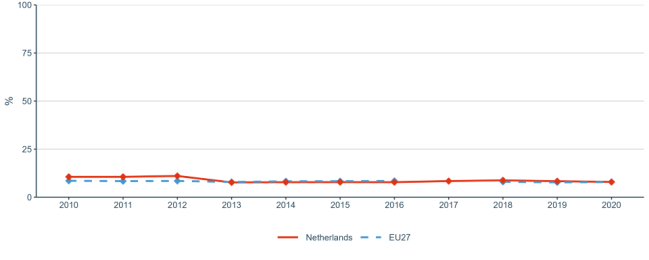ERA Country Report 2023
The Netherlands
Edited by Ad Notten (UNU MERIT)
as part of ‘Development of the ERA Scoreboard, the ERA Dashboard and the Regular Reports’ project for the European Commission, Directorate-General for Research and Innovation under Framework Contract N° 2018/RTD/A2/OP/PP-07001-2018 Lot 2 (EDAR)
Click here to download this country report![]()
- Table of contents
-
ERA Country Report 2023: The Netherlands
1. National context
1.1. Overview of the ERA policy agenda implementation
1.2. Policy context
2. Assessment of the Implementation of the ERA Policy Agenda and ERA Priorities
2.1. ERA Priority 1: Deepening a truly functional internal market for knowledge
2.2. ERA Priority 2: Taking up together the challenges posed by the twin green and digital transition and increasing society’s participation in the ERA
2.3. ERA Priority 3: Amplifying access to research and innovation excellence across the Union
2.4. ERA Priority 4: Advancing concerted research and innovation investments and reforms
3. Country-specific drivers and barriers
4. Final remarks
5. Bibliography
6. Annexes
6.1. Annex 1: Graphs
ERA Country Report 2023: The Netherlands
|
Key takeaways:
|
1. National context
1.1. Overview of the ERA policy agenda implementation
The Netherlands are an Innovation Leader with a performance of 128.7% of the EU average according to the European Innovation Scoreboard 2023. While the country’s performance is below the average of the Innovation Leaders, its performance is increasing at a rate marginally higher than that of the EU (0.2% points) ^ so the country’s lead over the EU is becoming more prominent. The delegation of R&I governance between two ministries and a limited number of executive bodies makes the R&I landscape relatively transparent and easy to navigate for those seeking advice and funding, contributing to the sector’s growth.
The Netherlands has committed to 16 ERA actions, which comprise all the actions under ERA Priority 1 and 2 and one each for ERA Priorities 3 and 4. The green and digital transition have been prioritised, with multiple and substantial funding initiatives dedicated to the implementation of the ERA actions related to these topics.
To support the implementation of the ERA actions, the Netherlands has drawn up action plans, agendas, roadmaps, agreements and covenants. Key R&I policies in the Netherlands include the EUR 5 billion Science Fund, the National Science Agenda, Knowledge and Innovation Agendas dealing with social challenges and key technologies, the Knowledge and Innovation Covenant ^ that details the budget of the above agendas, the Roadmap Human Capital: Topsectoren 2020-2023, and the Recovery and Resilience Plan focusing on the twin transitions. It is accompanied by a series of policy interventions, as summarised in the Policy letter higher education and science. These initiatives address concerns pointed out in the 2023 European Semester Report.
1.2. Policy context
Key national players in the Dutch R&I system are: (1) Ministry of Education, Culture and Science (Ministerie van Onderwijs, Cultuur en Wetenschap); (2) Ministry of Economic Affairs and Climate Policy (Ministerie van Economische Zaken en Klimaat); (3) Netherlands Organisation for Scientific Research (NWO); (4) Netherlands Enterprise Agency (Rijksdienst voor Ondernemend Nederland); (5) ZonMw. Other important stakeholders are the organisations that form the Knowledge Coalition, including universities, the Association of Universities of Applied Sciences, the Dutch secondary vocational education (MBO) providers, the Dutch Federation of University Medical Centres (NFU), the Applied Research Partnership TO2 Federation, the Royal Association of Small and Medium-Sized Enterprises (MBK Netherlands) and Confederation of Netherlands Industry and Employers (NVO/NCW). Although these are the leading institutions in charge of developing larger policies, the R&I landscape is more diverse. It includes other relevant stakeholders such as other sectoral organisations, think tanks and advisory bodies.
As mentioned above, several roadmaps, agendas and action plans are closely linked to the ERA Policy Agenda and address the priorities and actions laid out in it. In addition to those listed above, there are other policies and strategic documents that guide the Dutch R&I sector, including the “National Technology Strategy”, the “Innovation and Valorisation Action Plan”, the “Recognition & Rewards programme”, the “National Contact Point for Knowledge Security”, the “National Centre for Science Communication (NEWS)”, the “National Programme Open Science - 2030 Ambition Document and Rolling Agenda”, the “National Action Plan for more Diversity and Inclusiveness” in higher education (HE) and research, the “National Roadmap for Large-Scale Research Facilities”, and the “Global Climate Strategy: From ambition to transition”.
2. Assessment of the Implementation of the ERA Policy Agenda and ERA Priorities
Chapter 2 has two objectives: 1) It qualitatively assesses the state-of-play of the implementation of the ERA actions drawing on the European Semester Reports 2023, the OECD STIP Survey, the European Innovation Scoreboard 2023 and other sources ^ ; 2) It quantitatively assesses the country’s progress towards achieving the ERA priorities as set out on the Pact for Research and Innovation in Europe. The presented quantitative information is based on the ERA Scoreboard and ERA Dashboard indicators and covers longer-term trends since 2010. The general indicators for the R&I system, which are not linked to specific ERA priorities, are outlined in Table 1. Further details on data and graphs used in this report are included in Annex 1. This report will serve as a baseline for reporting in the future.
|
Indicator |
Most recent EU average |
Most Recent Metric |
|
Gross Domestic Expenditure on R&D (GERD) as a percentage of GDP |
2.26 (2021) |
2.25 (2021) |
|
Government Budget Allocations for R&D (GBARD) as a share of GDP |
0.76 (2021) |
0.8 (2021) |
|
Researchers (in full-time equivalent) per million inhabitants |
4,483.4 (2021) |
6,069.3 (2021) |
|
Business Enterprise expenditure on R&D (BERD) as a percentage of GDP |
1.49 (2021) |
1.50 (2021) |
Source: compiled by research team based on the ERA Scoreboard and ERA Dashboard indicators
2.1. ERA Priority 1: Deepening a truly functional internal market for knowledge
2.1.1. State of play in the implementation of the ERA Actions
To implement ERA Action 1: Enable the open sharing of knowledge and the re-use of research outputs, including through the development of the European Open Science Cloud (EOSC), the Dutch Ministry of Education, Culture and Science, together with the open science partners ^ signed a covenant on 29 March 2023. ^ In this document, they agreed to form a temporary consortium, called Open Science NL, aiming to accelerate the efforts to develop Open Science in the Netherlands. Until 2031, the consortium will utilise the funds earmarked for open science from the governmental “Research and Science” funds, with approximately EUR 184 million dedicated to this over the next ten years. Open Science is mentioned in two subsequent Coalition Agreements ^ : the launching of the National Plan Open Science (2017), appointing a National Coordinator Open Science (2018), and the sector agreement between the Minister of Education, Culture and Science. This attention has also been translated into funding ^ and infrastructure adjustments ^ as evidenced by the signing of the covenant and establishing the Open Science NL consortium.
The key strategic document for the implementation of ERA Action 2: Propose an EU copyright and data legislative framework for research, is the Dutch copyright law adopted in 2015. ^ The Taverne Amendment allows researchers to share short scientific works, regardless of any restrictive publisher’s guidelines, six months after the first (online) publishing date. Universities have developed workflows to help researchers to make use of this right. Most universities adopted so-called opt-out policies, meaning that publications by Dutch researchers are uploaded to institutional repositories automatically. In addition, the Dutch Research Council NWO has updated its open access policy to align with Plan S of cOAlition S. As part of that, NWO has also implemented a rights’ retention policy which ensures that funded grants retain the rights and can share them immediately. Recent studies have shown that 89% of the research in the Netherlands is now published Open Access. ^
Addressing ERA Action 3: Reform the Assessment System for research, researchers and institutions, Dutch knowledge institutions play a leading role in reforming research assessment. In 2018, the Dutch universities, university medical centres, funders and the Royal Academy published the position paper “Room for Everyone’s Talent”. This paper calls for a fundamental reform of the way academics are being recognised and rewarded with a better balance in the way research and teaching activities are being assessed. It means moving away from traditional metrics, valuing quantity over quality and including open science in assessment criteria. Moreover, the national Recognition and Rewards programme has been launched to ensure the implementation of these ambitions.
Another tangible result is the reformed Strategy Evaluation Protocol (SEP) for the evaluation of research units for 2021-2027 ^ , presented by the VSNU/KNAW/NWO on 11 June 2020. The emphasis of the protocol has shifted from the earlier type of research assessment, which focused mainly on productivity and academic impact, towards a focus on valorisation and knowledge transfer/education as well as team building and leadership skills. ^ In addition, Dutch institutions have been quick to join the EC led Coalition for Advancing Research Assessment. All Dutch institutions have signed the agreement, and the Dutch community participates actively in the various working groups.
In relation to ERA Action 4: Promote attractive research careers, talent circulation and mobility the Dutch government offers funding opportunities to develop careers and talent, exchange knowledge, and attract people to science in general. As introduced by the European Semester Report 2023, this is relevant to the current labour market challenges, which highlights the importance of creating an attractive work profile and enhancing the talent search. ^ Linking academia with industry is important in this respect, and the “Platform arrangement 2022-2024” is an example of how NWO promotes collaboration between lecturers who conduct research within the same theme. It ensures more strategic, thematic, and organisational coordination and knowledge sharing.
An example of talent development is the Talent Programme, offering personal grants to talented and creative researchers. It enables them to conduct the research of their choice. The programme has three funding instruments (Veni, Vidi, Vici) tailored to various career stages. As a supplement to the Marie Skłodowska-Curie Actions, NWO is funding early career academics through the Rubicon programme. Rubicon aims to encourage talented researchers who recently received their PhD to spend some time at research institutes outside of the Netherlands to further their scientific career, as international research experience is likely to be an advantage at a later stage in the academic career. The programme is open for all scientific disciplines to deliver a research project at a foreign research institute.
For ERA Action 5: Promote gender equality and foster inclusiveness, the Dutch government launched a national action plan for greater diversity and inclusion in higher education and research on 1 September 2020. The action plan focuses on creating an inclusive, diverse, and safe learning and working environment. This action plan sets five goals for higher education and research for 2025: (1) Embed diversity more effectively in existing instruments; (2) Monitor diversity more widely; (3) Establish an award system to provide frameworks and set the direction for policy; (4) Bring together and support institutional diversity plans and (5) Establish a national centre of excellence.
Dutch higher education and research is working with the government to take the next step towards achieving full diversity and inclusion of the sector. It will enable the Netherlands to contribute to ongoing and meaningful solutions to the major societal and scientific challenges facing the world today. These government efforts are not solely focused on the education and R&I sector but look further afield and try to achieve gender equality and inclusiveness goals for society as a whole. ^
In relation to ERA Action 6: Protect Academic Freedom in Europe, a recent report by the European Parliament analysed the state of academic freedom in the Netherlands. ^ The report praised the launch of the Dutch ‘SafeScience’ platform in 2022, which offers scientists immediate aid when threatened. ^ However, the report also concluded that the Netherlands should take steps to strengthen the legal protection of academic freedom. This critique led to questions in the Dutch Parliament regarding blurred boundaries between the political and academic perspectives. ^ Subsequently, the Royal Netherlands Academy of Arts and Sciences (KNAW) has made an effort to stimulate discussions on the topic of academic freedom and offers a theoretical framework defining academic freedom. ^ Furthermore, the Ministry of Science, Culture and Education commissioned an investigation into the degree of self-censorship experienced by students and academics with regards to academic freedom. The resulting report concludes that a large majority of Dutch students and academics do not feel the need to self-censor but that a significant minority does feel restricted in expressing themselves freely. ^
The Netherlands has signalled the importance of protecting the safety of scientists at the General UNESCO Council in 2023. It spearheads the development of a Safety of Scientists programme in this forum. ^ The EU report concludes that academic freedom is not sufficiently legally protected. In 2023, a report on academic self-censorship was published with recommendations along two lines: strengthening the academic basis and follow-up of incidents of harassment and violence to prevent self-censorship. ^
Some additional measures have already been implemented or will be in place in the future regarding transparency in research activities and committing to integrity in the Dutch academic environment. The government’s main objective is to promote openness and visibility of R&I initiatives and investments, while ensuring quality in accordance with the National Code of Conduct.
For ERA Action 7: Upgrade EU guidance for better knowledge valorisation the Dutch Higher Education and Research Act (WHW), already in 2005, stipulated that knowledge valorisation was a core task for the Dutch higher education system. Since then, investments in societally relevant and impactful research, and promoting knowledge transfer through start-up initiatives have taken place. This part of the Dutch science policy is translated into actionable industrial policy as exemplified by the “Top Sectors Roadmap 2020-2023” and the “Knowledge and Innovation Covenant 2022-2023” policy and budget documents. At the end of 2019, the “Topsectoren” policy initiative was launched according to which six Ministries, knowledge institutions and societal organisations started working on their Knowledge and Innovation Agendas. Dutch companies, research organisations, knowledge institutions and the government are investing EUR 4.9 billion in 25 missions and key technologies.
Addressing ERA Action 8: Strengthen sustainability, accessibility and resilience of research infrastructures in the ERA and following the Coalition Agreement of 2021, the Ministry of Economic Affairs and Climate Policy presented for the first time a (temporary) investment scheme aimed at applied research facilities for 2022-2031, with a total budget of EUR 475 million. The first round of the programme was launched in June 2022. The programme invests in high-quality and future-proof applied research facilities of both TO2 organisations (TNO, MARIN, Wageningen Research, NLR and Deltares) and National Knowledge Institutes (RKIs, research institutes closely linked to government). These facilities are crucial for the development of innovative products and services and for the implementation of (transition) policies. In 2023, 14 projects were selected for funding by an external advisory commission with a total budget of EUR 184 million. Additionally, in 2016, the NWO developed a policy on computing and data management that promoted the improvement of computing infrastructure. ^ In addition, it invested EUR 4.5 million in the three science-wide Digital Competence Centres (DCCs) ^ that were created in 2022 to enhance intensive research in the areas of data and infrastructure. In the Netherlands, computer systems are available for national use and managed by SURF, a collaborative IT platform. Researchers can apply for access to computing time and associated data services through the call for proposals for Computing Time on National Computer Facilities.
The Ministry of Education, Culture and Science, through the Permanent Committee for Large-Scale Research Infrastructure (PC-GWI) is working towards a sustainable ecosystem in the Netherlands Large-scale Research Infrastructure (LRI). Moreover, to support the computational data capability, the Ministry has developed the National Roadmap for Large-Scale Research Facilities 2021-2025. Nine research groups present their priorities for investments in large-scale scientific infrastructure for the next 10 years. At the end of 2022, the Ministry of Education, Culture and Science increased the budget for Roadmap calls to EUR 40 million per year. ^ This extra investment is used to increase the success rate and available funding for the two-yearly calls for Large-Scale Research Infrastructures. In 2023, NWO ran the latest call which resulted in nine projects receiving a combined EUR 140 million for large-scale research infrastructures. Additionally, the Ministry of Education, Culture and Science and NWO have made an additional EUR 10 million per year available for Dutch participation in international research infrastructures and presented a strategy on how to allocate this newly available budget to improve Dutch participation in international research infrastructures. ^
In relation to ERA Action 9: Promote a positive environment and level playing field for international cooperation based on reciprocity the European Union in 2020, together with the Member States and financial institutions, formed “Team Europe” to provide a collective global response to the COVID-19 pandemic. Although born out of crisis, the Team Europe approach has now become the norm for how investments in developing countries are managed by the EU. The Dutch Government formulated its Africa Strategy 2023-2032 in 2023, incorporating Team Europe initiatives such as those promoting closer cooperation with the African Continental Free Trade Area. NWO has followed up with the Science Diplomacy Fund.
2.1.2. Progress towards achieving ERA Priorities
With regard to Sub-priority 1.1: Open science, the Netherlands is above the EU-27 average both in 2009 and 2019 in terms of open access publications (with DOI) as a proportion of the total number of DOI publications. These open access publications account for over half of the total share in 2019 as shown in Figure 5 in Annex 1. Measuring progress towards Sub-priority 1.2: Research Infrastructure, the indicator share of national public R&D expenditure allocated to European research infrastructures in 2022 shows a value of 1.27% for the Netherlands, close to the 1.82% registered as the European average. ^ In addition, looking at the number of European research infrastructures in which a country participated, the Netherlands ranks 10 points above the EU average, with a value of 25 in 2021 compared to 15.46 in the EU-27 (Figure 6 in Annex 1).
In relation to Sub-priority 1.3: Gender equality, equal opportunities for all, and inclusiveness, the Netherlands is lagging behind the EU average in terms of gender equality and inclusiveness as can be seen through the share of women in grade A positions in HEIs and the proportion of women among doctoral graduates by narrow fields of STEM (Figures 7 and 8 in Annex 1), with the Dutch performance being below the EU-27 average. Even though some policies have been drawn up to remedy this, these do not have seem to have had the desired effect. In general, the Netherlands suffers from a “glass ceiling” problem, even though the impact that Dutch women have is higher than the EU average (Figure 9 in Annex 1). The proportion of women in authorships of the 10% most cited publications (Figure 10 in Annex 1) has been increasing in recent years in line with the EU-27 average. Similarly, in Figure 11 in Annex 1, the Netherlands is clearly above the EU average in the Women in Digital Index in 2022, with a value of 71.87.
In terms of Sub-priority 1.4: Careers and mobility of researchers and research assessment and reward system, Figure 13 in Annex 1 represents the new doctorate graduates per 1,000 inhabitants aged 25-34. Data for the Netherlands is available only since 2017 and has remained below the EU-27 average until 2021. For Job-to-job mobility of Human Resources and technology, both regions have followed the same trend between 2010 and 2020, and the Netherlands values surpass the European average (Figure 14 in Annex 1).
In relation to Sub-priority 1.5: Knowledge valorisation, the share of public-private co-publications per million population has experienced a strong increase (Figure 15 in Annex 1). This growth has been even higher than the increase at the EU-27 level, with the 2021 value nearly 300 points above EU-27 average. The number of PCT patent applications by million GDP has remained almost constant between 2010-2015, with the Netherlands above the EU average (Figure 16 in Annex 1). Figure 17 in Annex 1 shows the business enterprise researchers as % of national researchers and Figure 18 in Annex 1 on business enterprise researchers in FTE per thousand employees in the industry. For both indicators, the values are higher in the Netherlands than in EU-27 since 2010.
The Netherlands has also experienced a slight decrease in the share of innovating forms collaborating with HEI/PRO out of all innovative firms (11.68% in the Netherlands vs 13.27% in the EU-27 in 2020) as shown in Figure 19 of Annex 1.
Sub-priority 1.6: Scientific Leadership is measured through the share of publications among the 10% most cited, which has experienced slight decreases both at the EU level and in the Netherlands. Nevertheless, it remains well above the EU-27 average in the period 2010-2020 (Figure 20 in Annex 1). The Academic Freedom Index illustrates that the Netherlands has ranked very similarly until 2019, after which the score fell below the EU-27 average over the period 2020-2022, as indicated by Figure 21 in Annex 1.
In relation to Sub-priority 1.7: Global engagement, the share of international co-publications with non-EU partners in the public sector (Figure 22 in Annex 1) is considerably above the EU-27 average, with 2,475.57 compared to the EU-27 average of 1,278.97. Figure 23 in Annex 1 represents the European and international co-patenting in EPO applications at national and EU level, which was higher in the Netherlands from 2010 to 2013 and following the same trend as the EU-27.
2.2. ERA Priority 2: Taking up together the challenges posed by the twin green and digital transition and increasing society’s participation in the ERA
2.2.1. State of play in the implementation of the ERA Actions
The NWO has dedicated substantial funding for participation in European Partnerships ^ related to ERA Action 10: Make EU R&I missions and partnerships key contributors to the ERA. NWO seeks to contribute to the European co-funded partnerships under Horizon Europe by developing various thematic transnational calls together with the partners. Dutch researchers can jointly submit research proposals with international researchers, societal and/or industrial partners from the participating countries.
In addition to the NWO, the Dutch government participates in partnerships through research and innovation funders like ZonMw and RVO (the Netherlands Enterprise Agency). ^ Furthermore, at the request of the Dutch Ministry of Infrastructure and Water Management and the Ministry of Agriculture, Nature and Food Quality, possibilities have been created for Dutch researchers in the European co-funded partnership Water4all. The RVO also participates in several partnerships with a significant budget on behalf of the Ministry of Economic Affairs. National funder ZonMW participates in health-related partnerships.
The Netherlands has joined ERA Action 11: An ERA for green energy transformation with climate change, green transformation and climate neutrality being key priorities in Dutch politics and academia. The Netherlands seeks to reach energy neutrality nationally and with supra-national assistance by 2050. Under its Cohesion Policy 2021-2027 and through the Just Transition Fund, the Commission has adopted the Dutch Territorial Just Transition Plan (TJTP), making EUR 623 million available to support a fair transition to a climate-neutral economy. The Ministry of Economic Affairs and Climate Policy has a budget of EUR 60 million available to co-finance projects under the JTF. Nationally, the government has set several targets and has dedicated grants to invest in clean technologies and facilitate business investments in sustainable energy. ^
The NWO has reserved specific funding for several actions under ERA – Green Transformation. One example is the Driving Urban Transitions (DUT) funding action, a new European partnership within the Horizon Europe programme on urban change in a global context and for a sustainable future. The partnership aims to create attractive, sustainable and economically viable urban areas where European citizens, communities and their environment can thrive. The partnership consists of 40 funding parties from 27 countries. It is a follow-up to the European and international network JPI Urban Europe, which NWO initiated in 2008 and has participated in since.
NWO is involved in seven new European partnerships under the Horizon Europe programme, including Biodiversa, Water4all and Transforming Healthcare Systems. Another example is the Clean Energy Transition (CET) Partnership, aiming to stimulate and accelerate the energy transition. The partnership has identified several thematic research areas that help to promote transnational innovation ecosystems. The partnership supports the Strategic Energy Technology (SET) Plan, aiming to create a shared energy technology policy for Europe. NWO and RVO participated in this European partnership since its inception in September 2022. ^ In the first call of the CET Partnership in 2022, NWO concentrated on international partnerships focusing on Enhanced Zero Emission Power Technologies.
In relation to ERA Action 12: Accelerate the green/digital transition of Europe´s key industrial ecosystems, the Dutch Recovery and Resilience Plan has responded to the urgent need to foster a strong recovery while making the Dutch economy and society more resilient and future ready. In response to the energy market disruption caused by Russia's invasion of Ukraine, the Commission launched the REPowerEU Plan. Under this plan, EU countries are updating their recovery and resilience plans with new measures to save energy and diversify the EU’s energy supplies.
The investment scheme for Facilities for Applied Research mentioned earlier within ERA Action 8 is also crucial for developing, scaling and testing new technologies. Most of the 14 selected projects have links with the Green and Digital Transitions. A further practical example is the follow-up initiative that the Ministry of Economic Affairs and Climate Policy has started through the “Smart Industry” programme, which aims to strengthen Dutch industries by promoting cutting-edge IT technology, such as AI and robotics.
ERA Action 13: Empower Higher Education Institutions to develop in line with the ERA, and in synergy with the European Education Area is enhanced by a specific long-running programme called Comenius. The Comenius programme aims to support and accelerate educational innovation and improvements by professionals in higher education. With the Comenius Teaching Fellow grants, innovation projects with a duration of one year can be financed within three fixed themes and one open theme: (1) Accessibility in higher education, (2) Well-being in higher education, (3) Working on the challenges of the future and (4) Open theme – Fit for the future.
Finally, in terms of realising ERA Action 14: Bring Science closer to Citizens, the National Science Agenda (NWA) consists of an innovative process that brings together the input and knowledge of citizens and scientists on key issues for Dutch society. The NWA aims to combine this knowledge to achieve a positive and structural change for future Dutch society.
In addition to this, the Dutch government has set up a National Centre of Expertise on Science & Society, which, according to its Action Plan and commitment from the Dutch Minister for Education, Culture and Science, plans to engage Dutch citizens and provide insights into the science process and its discoveries to increase confidence and support for Dutch science.
2.2.2. Progress towards achieving ERA Priorities
Sub-priority 2.1: Challenge-based ERA actions are measured through different indicators. The first is the government budget allocation (GBARD) in research and development in energy, environment, and transport, telecommunications and other infrastructures (Figure 24 in Annex 1). The performance of the Netherlands is below the EU-27 average in terms of environment for the whole period, and although such a trend is similar regarding the energy allocation, there is a peak in 2018 where the value of the country surpasses the EU-27 average. For the GBARD in transport and telecommunications, the Netherlands performs above the EU-27 until 2015.
In relation to the GBARD allocated to European transnational, bilateral, or multilateral, public R&D programmes per FTE researcher in the public sector at the EU-27 level, this indicator stagnated between 2010 and 2020. In the case of the Netherlands, it remained below the EU-27 average during 2011-2020, as can be seen in Figure 25 in Annex 1. Figure 26 in Annex 1 shows, that the value for the Netherlands dropped in 2010 and has remained below the EU-27 average.
The indicator OECD Patents on environment technologies (Figure 28 in Annex 1) shows how the Netherlands is below the EU-27 value from 2010 to 2018. The indicator national public and private investments as suggested in the SET Plan progress report 2021, shows a slight but steady increase in the EU-27 average until 2019 and a fall in 2020, probably due to the COVID pandemic. For the Netherlands, the value has stayed above the EU-27 average as indicated by Figure 27 in Annex 1.
Measuring progress towards Sub-priority 2.2: Synergies with education and the European Skills Agenda is done using the share of researchers receiving transferable skills training. Figure 29 in Annex 1 shows that in the Netherlands, this number has decreased from 61.8% in 2016 to 54.9% in 2019, converging with the EU-27 average, which moved from 49.5% in 2016 to 46.3% in 2019.
Sub-priority 2.3: Synergies with sectorial policies and industrial policy, in order to boost innovation ecosystems is analysed through direct government support plus indirect government support through R&D tax incentives as a percentage of GDP. Figure 30 in Annex 1 shows that both the EU-27 average and the levels of the Netherlands are relatively constant over the period 2010-2020, with the Netherlands recording an increase since 2018.
Finally, regarding Sub-priority 2.4: An active citizen and societal engagement in R&I in all its dimensions, the indicator trust in science in the Netherlands is slightly above the value of 43.2% for the EU-27 (Figure 31 in Annex 1). The number of publications on “social innovation” or “social entrepreneurship” per million population has experienced increasing trends both for the EU average and the Netherlands from 2010 to 2021. Additionally, the Netherlands reached an impressive peak in 2016, getting closer to a value of 8, which can be seen in Figure 32 in Annex 1.
2.3. ERA Priority 3: Amplifying access to research and innovation excellence across the Union
2.3.1. State of play in the implementation of the ERA Actions
In relation to ERA Action 16: Improve EU-wide access to excellence, although the Netherlands did not commit to this action, access to the Dutch education system has remained open. Research outputs funded by the Dutch funding organisations have been opened up to other EU and third countries. It has been executed, amongst others, through the OpenScience and OpenAccess policy initiatives, as well as continuing support to opening up the Dutch higher education system proactively to EU students and researchers via Erasmus, MSCA and NWO funded international scholarships and positions.
For ERA Action 17: Enhance the strategic capacity of Europe´s public research performing organisations, the Dutch government aims to support organisations in enhancing the international strategic capacity of Dutch higher education, Regional Innovation Partners and R&D stakeholders. From the higher education side, UNL/KNAW/NWO/MinOCW actively support international consortia and partnerships with knowledge, talent acquisition, and retention. In terms of funding from the Dutch Ministry of Economic Affairs, Department of Entrepreneurship (RVO), ^ the Advisory Council for Science, Technology and Innovation (AWTI), the NWO (through their Knowledge and Innovations Agendas, KIAs), and the KNAW enhances the Dutch R&D capacity. Similarly, funded collaborations through the Eureka and the EU Matching Fund of the RVO are key for the growth of R&I. ^
The Dutch government also cooperates with professional organisations such as ARMA-NL to foster professionalisation of the research management and administration community aimed at improving the research and innovation ecosystem.
2.3.2. Progress towards achieving ERA Priorities
In relation to Sub-priority 3.1: More investments and reforms in countries and regions with lower R&I performance, the available indicator measures the increase in total R&D expenditure expressed as a percentage of GDP. Figure 33 in Annex 1 shows a slight downward trend of this indicator in the Netherlands from high levels, especially in 2013, ultimately aligning with the EU-27 average by 2021.
2.4. ERA Priority 4: Advancing concerted research and innovation investments and reforms
2.4.1. State of play in the implementation of the ERA Actions
In the context of ERA Action 19: Establish an efficient and effective ERA monitoring mechanism, the main suppliers of relevant and independent figures on R&I are Statistics Netherlands and the Rathenau Institute. They publish figures on income and expenditure of knowledge institutions, R&I personnel and innovation in companies. Furthermore, SEO Amsterdam Economics publishes the Dutch Innovation Monitor.
2.4.2. Progress towards achieving ERA Priorities
In relation to Sub-priority 4.1: Coordination of R&I investments, the share of public R&D expenditure financed by the private sector experienced a slight decrease between 2010 and 2020, with Dutch values nearly identical to the EU-27 average as indicated by Figure 34 in Annex 1.
3. Country-specific drivers and barriers
The drivers for implementing the ERA actions include a close alignment between the national R&I priorities and the ERA Policy Agenda, a strong public science base, and a commitment to ongoing R&I investments. This report identified many policy initiatives and funding programmes across various ERA actions, particularly those associated with open science, research infrastructures, green and digital transitions, researcher careers, mobility, equality and inclusiveness.
The European Semester 2023 report recognises the country has a strong public science base. The research intensity in the country has increased slightly since 2019, measured by Gross Domestic Expenditure on R&D (GERD) as a percentage of GDP (despite not reaching the national target of 2.5%). The Government recognises the need for longer-term investments in R&I with several multiannual investment plans in place, including the R&I pillar in the National Growth Fund (EUR 20 billion between 2021-2025) and Research and Science Fund (EUR 5 billion between 2022-2031) providing longer-term support to the R&I sector. ^
Despite the strengths identified above, some challenges remain. The lack of skilled staff is one of the barriers in the R&I system identified in the European Semester Report 2023, ^ more specifically in ICT. It has implied a threat to the development of R&I and the green and digital transition. ^ The European Semester 2023 report also acknowledges a need to build on a strong research base within the country to increase the societal impact of the Dutch R&I system and to support the aims related to green and digital transitions. ^
4. Final remarks
The Netherlands has been developing its policies in line with the ERA priorities as defined in the Pact for R&I in Europe. There are some areas in which the Netherlands is performing well above the EU-27 average, including the share of foreign doctorate students as a percentage of all doctorate students, the share of public-private co-publications per million population and the presence of strong digital skills among women according to the Women in Digital Index.
The Dutch government’s focus on the three main goals of strengthening its educational foundations and quality of education, investing in diversity and talent, and focusing on knowledge valorisation match the ERA Policy Agenda. An emphasis on skills development and attracting foreign knowledge has been successful and has supported the internationalisation of Dutch R&I.
The focus of Dutch R&I priorities is included in the Smart Specialisation strategy. It is evidenced by the top sectors, missions, and key technologies in which the country is investing, as well as the Knowledge and Innovation Agendas (KIAs) on which its research is focuses. Furthermore, the focus and funding from the Recovery and Resilience Plan/Fund and other national funds add to the existing green and digital transition focal areas of the Dutch R&I landscape. Good examples here are the water management and quantum AI knowledge hubs that are being expanded.
5. Bibliography
Adviesraad voor wetenschap, technologie en innovatie (AWTI) (2023) Werkwijze, werkprogramma en jaarverslag. Available at: https://www.awti.nl/over-ons/werkwijze-werkprogramma-en-jaarverslag
Dekker, S. (2017) Kamerbrief Voortgang Open Science. Available at: https://www.tweedekamer.nl/kamerstukken/brieven_regering/detail?id=2017Z00637&did=2017D01327
ERA Portal Austria (2016) The Netherlands’ contribution to the European Research Area - 1 May 2016. Available at: https://era.gv.at/public/documents/2898/NL_Final_draft_The_Netherlands_contribution_to_the_European_Research_Area.pdf
Erkennen & Waarderen (2022) Annual report recognition & rewards. Available at: https://recognitionrewards.nl/wp-content/uploads/2023/03/Erkennen-Waarderen_jaarverslag-2022.pdf
Erkennen & Waarderen (2023) Road map recognition & rewards. Available at: https://recognitionrewards.nl/about/roadmap/
Eureka (2023) Eureka – Innovation Beyond Border – Annual Report 2022. Available at: https://www.eurekanetwork.org/about-us/Annual%20report%202022.pdf
European Commission (2022) EU Cohesion Policy: €623 million for a just transition to climate neutrality in the Netherlands. Available at: https://ec.europa.eu/commission/presscorner/detail/en/ip_22_7372
European Commission (2023) Council Recommendation - on the 2023 National Reform Programme of the Netherlands and delivering a Council opinion on the 2023 Stability Programme of the Netherland. Available at: https://commission.europa.eu/system/files/2023-05/COM_2023_619_1_EN.pdf
European Commission (2023) European Innovation Scoreboard 2023 and the Regional Innovation Scoreboard 2023. Available at: https://ec.europa.eu/research-and-innovation/en/statistics/performance-indicators/european-innovation-scoreboard/eis
European Commission (2023) 2023 European Semester: Country Reports – The Netherlands. Available at: https://economy-finance.ec.europa.eu/publications/2023-european-semester-country-reports_en
European Commission (2023) Netherlands’ recovery and resilience plan. Available at: https://commission.europa.eu/business-economy-euro/economic-recovery/recovery-and-resilience-facility/country-pages/netherlands-recovery-and-resilience-plan_en
European Commission (2023) The Just Transition Fund. Available at: https://commission.europa.eu/strategy-and-policy/priorities-2019-2024/european-green-deal/finance-and-green-deal/just-transition-mechanism/just-transition-funding-sources_en
European Parliamentary Research Service, Scientific Foresight Unit (STOA) (2023) State of play of academic freedom in the EU Member: States overview of de facto trends and developments. Available at: https://www.rijksoverheid.nl/documenten/rapporten/2023/03/15/bijlage-rapport-state-of-play-of-academic-freedom-in-the-eu-member-states-overview-of-de-facto-trends-and-developments
Equileap (2021) Gender Equality in the Netherlands: Assessing 100 leading companies on workplace equality - Special Report October 2021. Available at: https://equileap.com/wp-content/uploads/2021/10/Equileap_DutchReport_2021.pdf
Gompel S.J. van, Hugenholtz, P.B., Poort, J.P., Schumacher, L.D. & Visser, D.J.G. (2020) Evaluatie Wet Auteurscontractenrecht: Eindrapport. Available at: https://www.rijksoverheid.nl/documenten/rapporten/2020/11/18/tk-evaluatie-acr-eindrapport
JISC (2023) The Future Research Assessment Programme. Available at: https://beta.jisc.ac.uk/future-research-assessment-programme
Koens, L. and Vennekens, A. (2022) Wetenschappelijke publicaties via open access. Available at: https://www.rathenau.nl/nl/wetenschap-cijfers/output/publicaties/wetenschappelijke-publicaties-open-access
Koninklijke Nederlandse Akademie van Wetenschappen (KNAW) (2022) Sociale veiligheid in de Nederlandse wetenschap - Van papier naar praktijk. Available at: https://www.knaw.nl/publicaties/sociale-veiligheid-de-nederlandse-wetenschap-van-papier-naar-praktijk-0
Koninklijke Nederlandse Akademie van Wetenschappen (KNAW) (2023) Akademielezing 2023: Academische vrijheid als opgave - Over wetenschappelijke verantwoordelijkheid en de moed om te twijfelen. Available at: https://www.knaw.nl/publicaties/academische-vrijheid-nederland & https://www.knaw.nl/publicaties/akademielezing-2023-academische-vrijheid-als-opgave-over-wetenschappelijke
Ministerie van Economische Zaken en Klimaat (2022) Kamerbrief met Actieplan innovatie en valorisatie. Available at: https://www.rijksoverheid.nl/documenten/kamerstukken/2022/11/11/kamerbrief-innovatie-en-impact
Ministerie van Economische Zaken en Klimaat (2023) Kamerbrief over herijkte missies van het missiegedreven innovatiebeleid. Available at: https://www.rijksoverheid.nl/documenten/kamerstukken/2023/05/30/herijkte-missies-van-het-missiegedreven-innovatiebeleid
Ministerie Justitie en Veiligheid (2020) Kamerbrief Evaluatie Wet Auteurscontractenrecht Eindrapport. Available at: https://open.overheid.nl/documenten/ronl-815ddb59-327a-41d4-af6d-5111938c5023/pdf
Ministerie van Onderwijs, Cultuur en Wetenschap (2019) Kamerbrief “Factsheet Rathenau Instituut over Open Access”. Available at: https://zoek.officielebekendmakingen.nl/kst-31288-1027.html
Ministerie van Onderwijs, Cultuur en Wetenschap (2019) Kamerbrief “Voortgang open access van wetenschappelijke publicaties”. Avialable at: https://zoek.officielebekendmakingen.nl/kst-31288-881.html
Ministerie van Onderwijs, Cultuur en Wetenschap (2019) Nieuwsgierig en betrokken: De waarde van wetenschap. Available at: https://www.rijksoverheid.nl/documenten/publicaties/2019/01/28/nieuwsgierig-en-betrokken
Ministerie van Onderwijs, Cultuur en Wetenschap (2020) Kamerbrief over Internationale Kennis- en Talentstrategie. Available at: https://www.rijksoverheid.nl/documenten/kamerstukken/2020/12/18/internationale-kennis-en-talentstrategie
Ministerie van Onderwijs, Cultuur en Wetenschap (2020) Kamerbrief Plan S. Available at: https://www.rijksoverheid.nl/documenten/kamerstukken/2020/10/09/antwoord-vragen-van-het-lid-paternotte-d66-over-plan-s
Ministerie van Onderwijs, Cultuur en Wetenschap (2020) Rijksbegroting 2020 - VIII Onderwijs, Cultuur en Wetenschap - Open Access in de Rijksbegroting. Available at: https://open.overheid.nl/documenten/ronl-49aef31e-ca99-412a-b485-8544a59f2323/pdf
Ministerie van Onderwijs, Cultuur en Wetenschap (2021) Kamerbrief voortgang van het nationale actieplan voor meer diversiteit en inclusie in het hoger onderwijs en onderzoek. Available at: https://www.rijksoverheid.nl/documenten/kamerstukken/2021/07/09/voortgang-nationaal-actieplan-voor-meer-diversiteit-en-inclusie-in-het-hoger-onderwijs-en-onderzoek
Ministerie van Onderwijs, Cultuur en Wetenschap (2022) Beleidsbrief Hoger Onderwijs en Wetenschap. Available at: https://www.rijksoverheid.nl/documenten/kamerstukken/2022/06/17/aan-de-tweede-kamer-beleidsbrief-hoger-onderwijs-en-wetenschap
Ministerie van Onderwijs, Cultuur en Wetenschap (2022) Kamerbrief Ondersteuning voor de Nederlandse deelnemers aan het Europese Universiteiten Initiatief. Available at: https://open.overheid.nl/repository/ronl-8fc80d6d47fe586c881e34c254f3c8802d8c7e52/1/pdf/ondersteuning-voor-de-nederlandse-deelnemers-aan-het-europese-universiteiten-initiatief.pdf
Ministerie van Onderwijs, Cultuur en Wetenschap (2022) Kamerbrief Voortgang nationaal actieplan voor meer diversiteit en inclusie hoger onderwijs en onderzoek. Available at: https://www.rijksoverheid.nl/documenten/kamerstukken/2022/07/14/kamerbrief-voortgang-nationaal-actieplan-voor-meer-diversiteit-en-inclusie-hoger-onderwijs-en-onderzoek
Ministerie van Onderwijs, Cultuur en Wetenschap (2023) Antwoorden Kamervragen over rapport EP over academische vrijheid. https://www.rijksoverheid.nl/documenten/kamerstukken/2023/05/24/beantwoording-kamervragen-over-het-rapport-state-of-play-of-academic-freedom-in-the-eu-member-states-overview-of-de-facto-trends-and-developments
Ministerie van Onderwijs, Cultuur en Wetenschap (2023) Kamerbrief inzake voortgang programma ‘Erkennen & Waarderen’. Available at: https://www.rijksoverheid.nl/documenten/kamerstukken/2023/03/30/kamerbrief-inzake-voortgang-programma-erkennen-waarderen
Ministerie van Onderwijs, Cultuur en Wetenschap (2023) Open Science NL versnelt transitie naar open science: Lancering Regieorgaan Open Science. Available at: https://www.rijksoverheid.nl/documenten/kamerstukken/2023/03/29/open-science-nl-versnelt-transitie-naar-open-science
Ministerie van Onderwijs, Cultuur en Wetenschap (2023) Voortgangsbrief bestuursakkoord en beleidsbrief hoger onderwijs en wetenschap. Available at: https://www.rijksoverheid.nl/documenten/kamerstukken/2023/07/12/eerste-voortgangsbrief-bestuursakkoord-en-beleidsbrief-hoger-onderwijs-en-wetenschap
Moors, A. (2023) EU-rapport over academische vrijheid in Nederland verwart politieke met wetenschappelijke diversiteit aan perspectieven. Available at: https://www.scienceguide.nl/2023/05/eu-rapport-over-academische-vrijheid-in-nederland-verwart-politieke-met-wetenschappelijke-diversiteit-aan-perspectieven/
Nationaal Programma Open Science (NPOS) (2022) Open Science 2030 in Nederland, Ambitiedocument en rollende agenda. Available at: https://www.rijksoverheid.nl/documenten/rapporten/2022/12/07/bijlage-npos-2030-ambitiedocument-en-rolling-agenda
Nationaal Regieorgaan Onderwijsonderzoek (NRO) (2023) Comeniusprogramma. Available at: https://www.nro.nl/onderzoeksprogrammas/comeniusprogramma
National Centre of Expertise on Science & Society (2023) Action plan for the National Centre of Expertise on Science & Society. Available at: https://zenodo.org/records/7808844#.ZDl_SHbP02x
Nationale Agentschappen Erasmus+ (2023) Erasmus+. Available at: https://www.erasmusplus.nl/het-programma
Nederlandse Arbeidsinpsectie (2021) WOinActie. Available at: https://www.nlarbeidsinspectie.nl/publicaties/rapporten/2021/07/08/woinactie
Nederlandse Organisatie voor Wetenschappelijk Onderzoek (NWO) (2018) Karel Luyben benoemd tot Nationaal Coordinator Open Science. Available at: https://www.nwo.nl/nieuws/karel-luyben-benoemd-tot-nationaal-coordinator-open-science
Nederlandse Organisatie voor Wetenschappelijk Onderzoek (NWO) (2020) Implementatieplan Plan S. Available at: https://www.nwo.nl/sites/nwo/files/media-files/20201218_Implementatieplan%20Plan%20S_JULI2020v2.pdf
Nederlandse Organisatie voor Wetenschappelijk Onderzoek (NWO) (2021) National Roadmap for Large-Scale Research Facilities Available at: https://www.nwo.nl/en/researchprogrammes/national-roadmap-for-large-scale-research-facilities
Nederlandse Organisatie voor Wetenschappelijk Onderzoek (NWO) (2022) Platformregeling 2022-2024 - Subsidy for the start or development of a lector platform. Available at: https://www.nwo.nl/en/calls/platformregeling-2022-2024
Nederlandse Organisatie voor Wetenschappelijk Onderzoek (NWO) (2023) Academie & Arbeidsmarkt (2023) Available at: https://www.nwo.nl/academie-arbeidsmarkt
Nederlandse Organisatie voor Wetenschappelijk Onderzoek (NWO) (2023) Computing time on national computer facilities. Available at: https://www.nwo.nl/en/calls/computing-time-national-computer-facilities
Nederlandse Organisatie voor Wetenschappelijk Onderzoek (NWO) (2023) De Nationale Wetenschapsagenda (NWA). Available at: https://www.nwo.nl/onderzoeksprogrammas/nationale-wetenschapsagenda
Nederlandse Organisatie voor Wetenschappelijk Onderzoek (NWO) (2023) Driving Urban Transitions - To a Sustainable Future (DUT). Available at: https://www.nwo.nl/en/researchprogrammes/european-partnerships/driving-urban-transitions-sustainable-future-dut
Nederlandse Organisatie voor Wetenschappelijk Onderzoek (NWO) (2023) European Partnerships. Available at: https://www.nwo.nl/en/researchprogrammes/european-partnerships
Nederlandse Organisatie voor Wetenschappelijk Onderzoek (NWO) (2023) Gravitation. Available at: https://www.nwo.nl/en/researchprogrammes/gravitation
Nederlandse Organisatie voor Wetenschappelijk Onderzoek (NWO) (2023) Kennis- en innovatieagenda's. Available at: https://www.nwo.nl/onderzoeksprogrammas/perspectief/procedure-perspectief-programmas/kennis-en-innovatieagendas
Nederlandse Organisatie voor Wetenschappelijk Onderzoek (NWO) (2023) Knowledge and Innovation Agendas (KIAs). Available at: https://www.nwo.nl/en/researchprogrammes/perspectief/procedure-perspectief-programmes/knowledge-and-innovation-agendas
Nederlandse Organisatie voor Wetenschappelijk Onderzoek (NWO) (2023) Open Science Fund. Available at: https://www.nwo.nl/onderzoeksprogrammas/open-science/open-science-fund
Nederlandse Organisatie voor Wetenschappelijk Onderzoek (NWO) (2023) Talent Programme – Veni, Vidi, Vici. Available at: https://www.nwo.nl/en/calls/nwo-talent-programme
Nederlandse Organisatie voor Wetenschappelijk Onderzoek (NWO) (2023) The Clean Energy Transition Partnership. Available at: https://www.nwo.nl/en/researchprogrammes/european-partnerships/clean-energy-transition
Nederlandse Organisatie voor Wetenschappelijk Onderzoek (NWO) (2023) Theme Diversity & Inclusion. Available at: https://www.nwo.nl/diversiteit-en-inclusie
Nederlandse Organisatie voor Wetenschappelijk Onderzoek (NWO) (2023) Theme Open Science. Available at: https://www.nwo.nl/open-science
Nederlandse Organisatie voor Wetenschappelijk Onderzoek (NWO) (2023) Rubicon 2023-2. Available at: https://www.nwo.nl/en/calls/rubicon-2023-2
Nederlandse Organisatie voor Wetenschappelijk Onderzoek (NWO) (2023) The Netherlands and Europe. Available at: https://www.nwo.nl/en/netherlands-and-europe
OECD (2023) STIP Compass. Available at: https://stip.oecd.org/stip/
open access.nl (2017) Nationaal Plan Open Science gepresenteerd. Available at: https://www.openaccess.nl/nl/actueel/nationaal-plan-open-science-gepresenteerd
open access.nl (2020) Vervolg Pilot `You share, we take care'. Available at: https://www.openaccess.nl/nl/in-nederland/you-share-we-take-care
open access.nl (2022) UNL Monitor Open Access. Available at: https://www.openaccess.nl/nl/in-nederland/monitor
open access.nl (2023) Publisher deals. Available at: https://www.openaccess.nl/en/in-the-netherlands/publisher-deals
Rathenau Instituut (2023) How the science system works. Available at: https://www.rathenau.nl/en/how-science-system-works
Regieorgaan Open Science NL (2022) De opdracht van Open Science NL. Available at: https://www.openscience.nl/de-opdracht-van-open-science-nl
Research Data Netherlands (RDNL) (2023) Partners. Available at: https://researchdata.nl/en/home-2/partners/
Research Data Netherlands (RDNL) (2023) Who are we? Available at: https://researchdata.nl/en/who-are-we/
Rijksdienst voor Ondernemend Nederland (2023) Eureka: programma internationale marktgerichte R&D. Available at: https://www.rvo.nl/subsidies-financiering/eureka
Rijksoverheid (2015) Gewijzigd amendement van het lid Taverne ter vervanging van dat gedrukt onder Nr. 8. Available at: https://zoek.officielebekendmakingen.nl/kst-33308-11.html
Rijksoverheid (2020) Nationaal actieplan voor meer diversiteit en inclusie in wetenschappelijk onderwijs en onderzoek. Available at: https://www.rijksoverheid.nl/actueel/nieuws/2020/09/01/nieuw-nationaal-actieplan-voor-diversiteit-en-inclusie
Rijksoverheid (2022) Global Climate Strategy - from ambition to transition. Available at: https://www.government.nl/binaries/government/documenten/publications/2022/12/22/global-climate-strategy/The+Netherlands+Global+Climate+Strategy.pdf
Rijksoverheid (2022) Wet van 15 juni 2022 tot wijziging van de Wet subsidiëring landelijke onderwijsondersteunende activiteiten 2013 in verband met de toebedeling van wettelijke taken op het gebied van internationalisering binnen het onderwijs (Wet wettelijke taken internationalisering onderwijs). Staatsblad van het Koninkrijk der Nederlanden: Jaargang 2022, Nr. 269. Available at: https://www.neth-er.eu/media/2C6P2H1U5N/docs/staatsblad2692022nether.pdf
Rijksoverheid (2023) Central government encourages sustainable energy. Available at; https://www.government.nl/topics/renewable-energy/central-government-encourages-sustainable-energy
Rijksoverheid (2023) Encouraging Innovation. Available at: https://www.government.nl/topics/enterprise-and-innovation/encouraging-innovation
Rijksoverheid (2023) Netherlands contribution public consultation Horizon Europe. Available at: https://www.rijksoverheid.nl/documenten/kamerstukken/2023/02/23/netherlands-contribution-public-consultation-horizon-europe
Scholvinck, A-F. and Diederen, P. (2021) Samen verder met Open Science. Available at: https://www.rathenau.nl/nl/kennis-voor-transities/samen-verder-met-open-science
Smart Industry (2023) Aan de slag met Smart Industry. Available at: https://smartindustry.nl/
Tax administration (2023) Can I apply for the 30% facility if I come to work in the Netherlands? Available at: https://www.belastingdienst.nl/wps/wcm/connect/en/individuals/content/coming-to-work-in-the-netherlands-30-percent-facility
Topsectoren (2021) Roadmap Human Capital Topsectoren 2020 – 2023. Available at: https://www.topsectoren.nl/publicaties/kamerstukken/2021/04/15/topsectoren-roadmap-2020-2023
Topsectoren (2022) KIC tabel 2022-2023 - Kennis- en Innovatieconvenant 2020-2023: budgetten voor missiegedreven topsectoren- en innovatiebeleid. Available at: https://www.topsectoren.nl/publicaties/publicaties/publicaties-2022/nov/23-11-22/tabel-kic-2022-2023
Topsectoren (2023) Topsectoren. Available at: https://www.topsectoren.nl/innovatie
Tweede Kamer der Staten-Generaal (2017) Motie van de leden Straus en Duisenberg over advies van de KNAW over zelfcensuur en beperking van diversiteit van perspectieven in de wetenschap. Available at: https://www.tweedekamer.nl/kamerstukken/detail?id=2017Z01579&did=2017D03296
Universiteiten van Nederland (UNL) (2020) Strategy Evaluation Protocol - SEP 2021-2027. Available at: https://www.universiteitenvannederland.nl/files/documenten/Domeinen/Onderzoek/Slides_SEP_training_secretarissen_11-6-2020.pdf
Universiteiten van Nederland (UNL) (2021) Strategy Evaluation Protocol (SEP) 2021–2027 – VSNU, KNAW, NWO. Available at: https://www.universiteitenvannederland.nl/files/documenten/Domeinen/Onderzoek/SEP_2021-2027.pdf
Universities of the Netherlands (UNL), Netherlands Federation of University Medical Centres (NFU) & The Royal Netherlands Academy of Arts and Sciences (KNAW) (2023) Position Paper Horizon Europe and Beyond. Available at: https://www.nfu.nl/sites/default/files/2023-02/UNL_NFU_KNAW_Position_Paper_Horizon_Europe_and_Beyond.pdf
Van den Broek-Honingh, N., Schel, M. and Vennekens, A. (2020) Ontwikkeling derde geldstroom en beïnvloeding van wetenschappelijk onderzoek - Een data- en literatuuronderzoek ter beantwoording van de motie-Westerveld. Available at: https://www.rathenau.nl/sites/default/files/2020-10/RAPPORT_Ontwikkeling_derde%20geldstroom_en_be%C3%AFnvloeding_wetenschappelijk_onderzoek_Rathenau_Instituut.pdf
VSNU (Association of Universities in the Netherlands), NWO (Netherlands Organisation for Scientific Research), NFU (Netherlands Federation of University Medical Centres) and ZonMw (Netherlands Organisation for Health Research and Development) (2021) Recognition & Rewards (Erkennen & Waarderen) programme. Available at: https://www.universiteitenvannederland.nl/recognitionandrewards/recognition-and-rewards/index.html
VVD, CDA, D66 en ChristenUnie (2017) Vertrouwen in de toekomst: Regeerakkoord 2017-2021. Available at: https://open.overheid.nl/documenten/ronl-20f5fe94-8f10-4370-8488-8d3ba568bb4c/pdf
VVD, D66, CDA en ChristenUnie (2022) Omzien naar elkaar, vooruitkijken naar de toekomst: Coalitieakkoord 2021-2025. Available at: https://www.rijksoverheid.nl/documenten/publicaties/2022/01/10/coalitieakkoord-omzien-naar-elkaar-vooruitkijken-naar-de-toekomst
Waltman, L. and W.S. Lamers (2022) Monitoring Open Access publishing of NWO-funded research (2015-2021), Available at: https://zenodo.org/record/7105355#.Y8acN3bMKUk
Wetenschappelijk Onderzoek- en Documentatiecentrum (2023) Wetenschappelijk Onderzoek- en Documentatiecentrum. Available at: https://www.wodc.nl
6. Annexes
6.1. Annex 1: Graphs
The 2023 ERA Scoreboard and ERA Dashboard indicators used in the country report are presented in this annex. Detailed information on the data sources, description of the indicators, time period for which the data is available, and the necessary calculations can be found in the ERA Scoreboard and ERA Dashboard Methodology Report. In addition, the analysis aims to use the latest data available for each indicator, however in some cases available data stems only from several years ago.
General Indicators
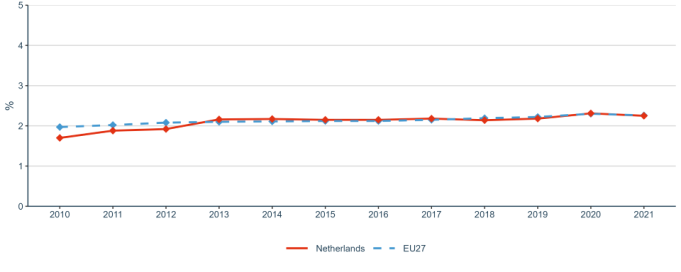

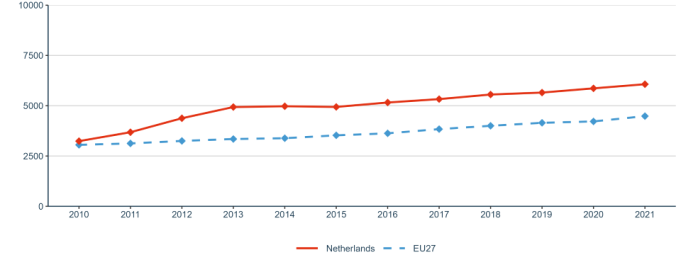
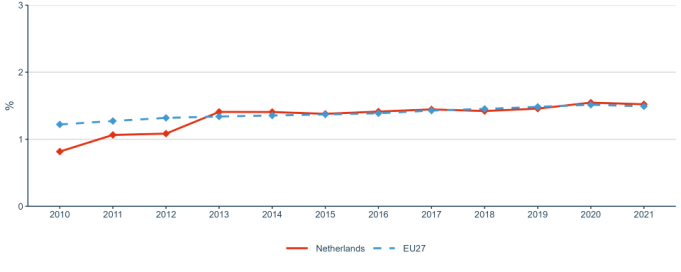
Priority 1: Deepening a truly functioning internal market for knowledge
Sub-priority 1.1: Open Science

Sub-priority 1.2: Research infrastructures
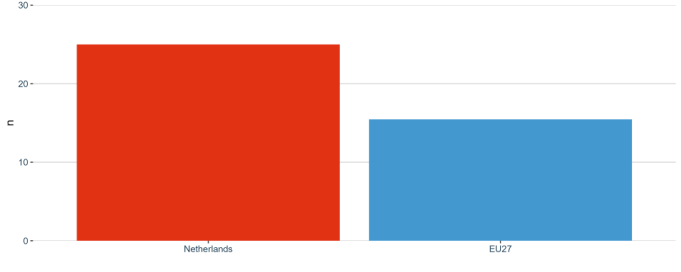
Sub-priority 1.3: Gender equality, equal opportunities for all and inclusiveness


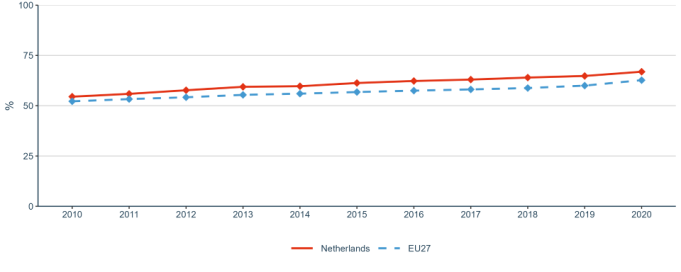

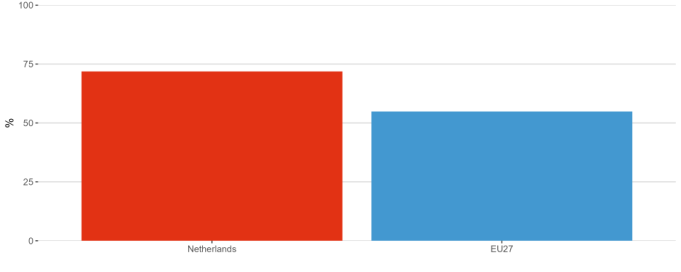
Sub-priority 1.4: Researchers’ careers and mobility and research assessment and reward systems
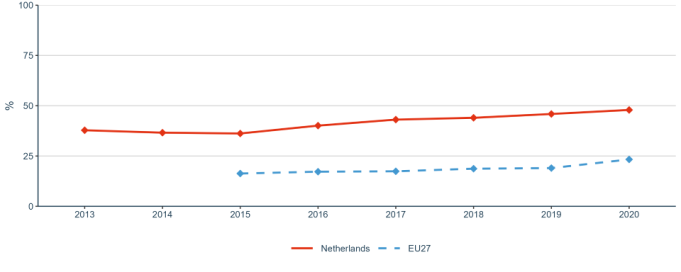


Sub-priority 1.5: Knowledge valorisation
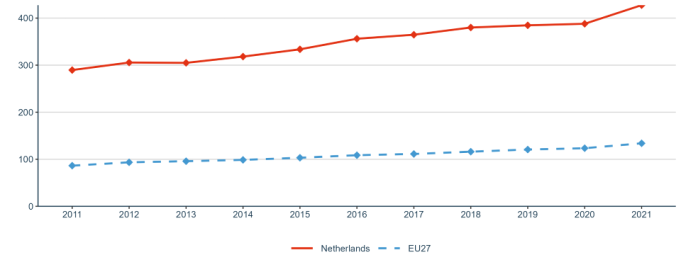



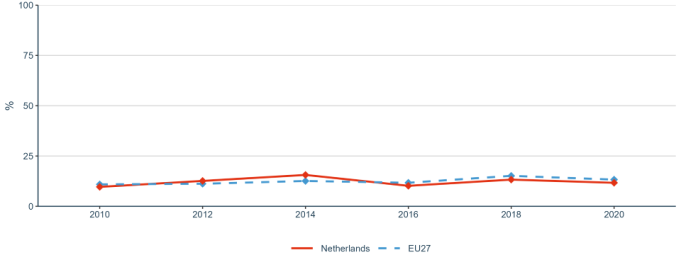
Sub-priority 1.6: Scientific leadership
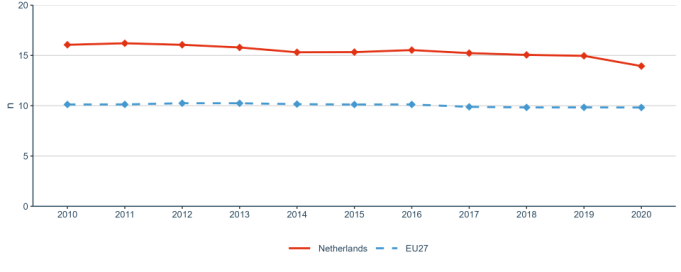
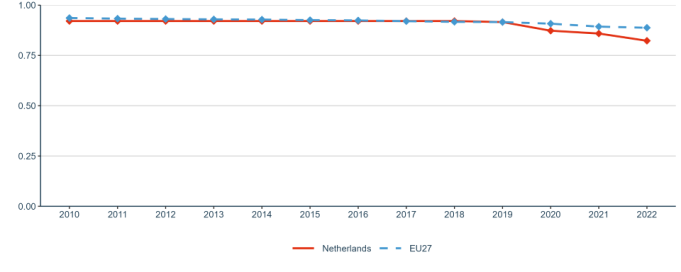
Sub-priority 1.7: Global engagement
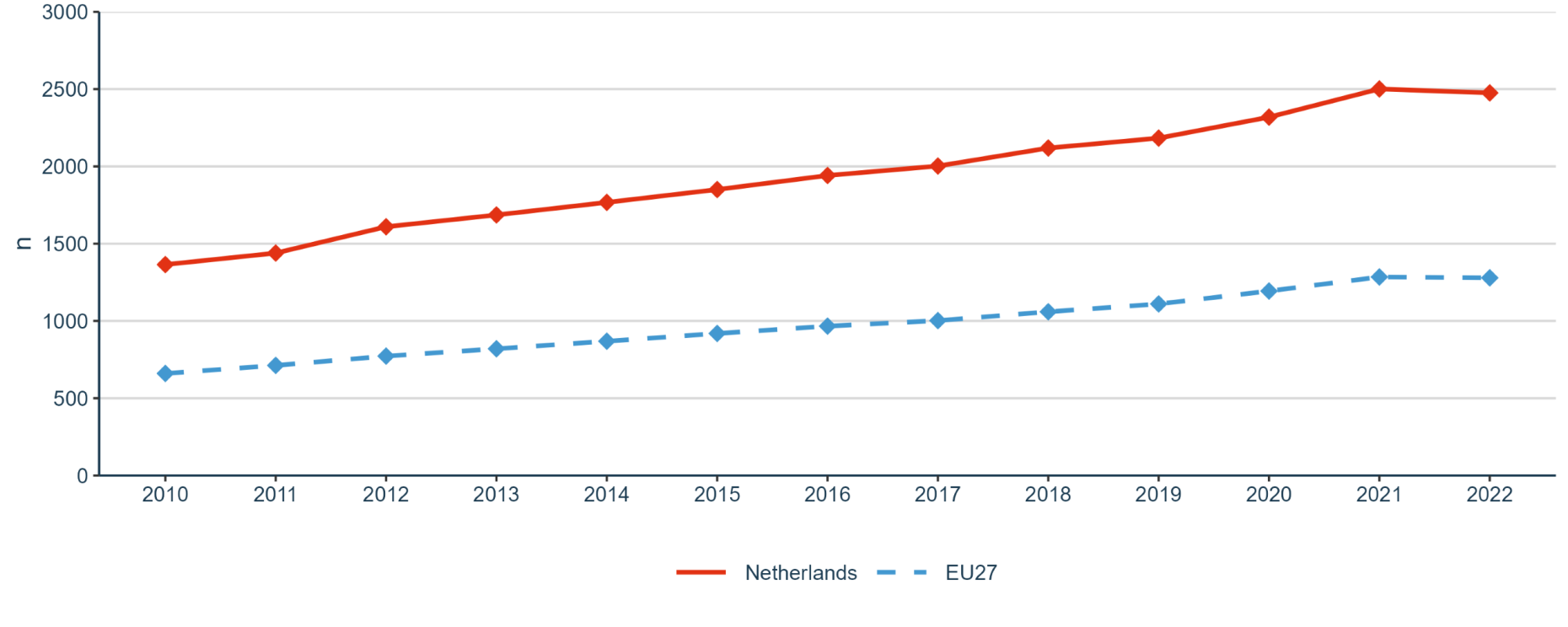
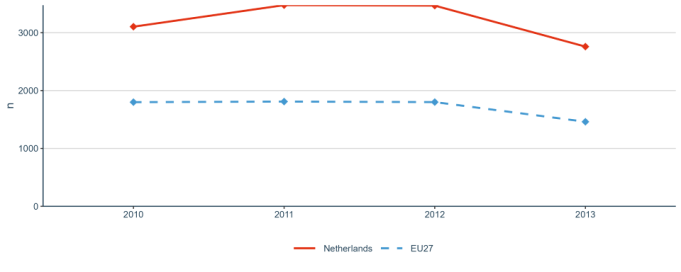
Priority 2: Taking up together the challenges posed by the twin green and digital transition and increasing society’s participation in the ERA
Sub-priority 2.1: Challenge-based ERA actions
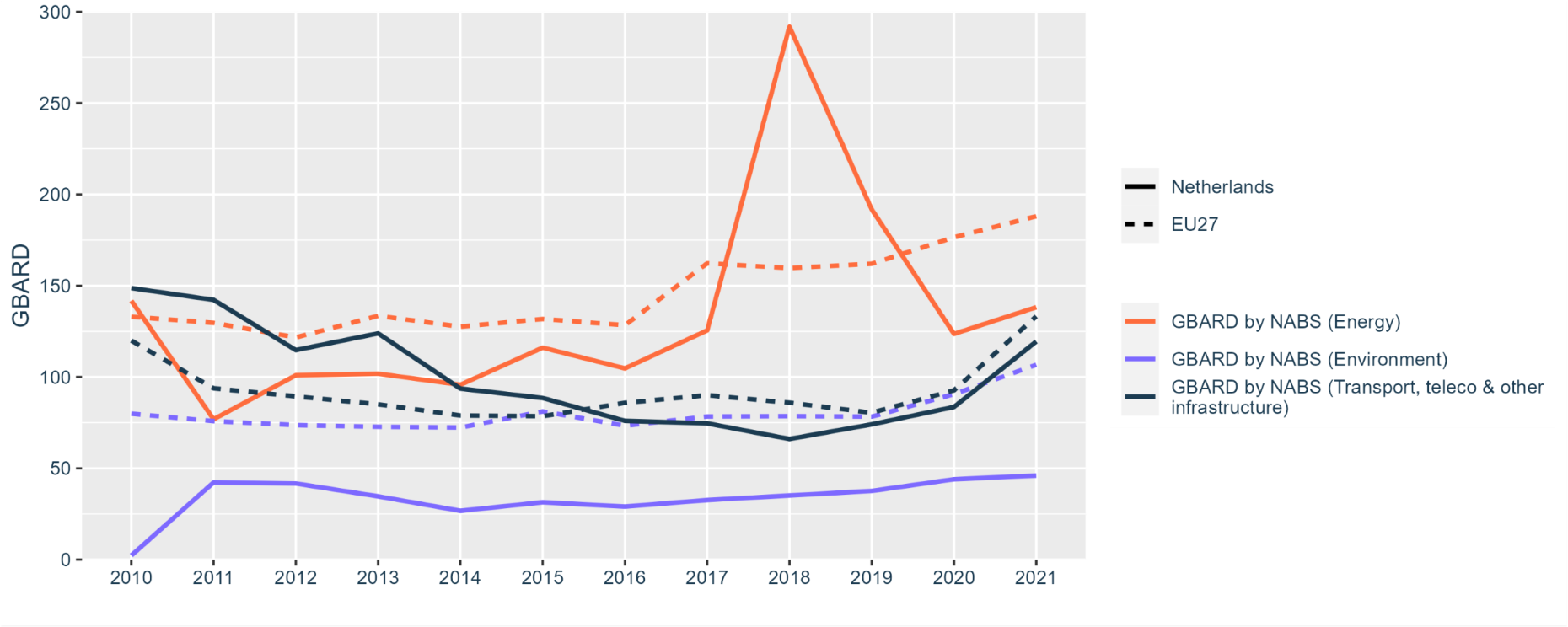
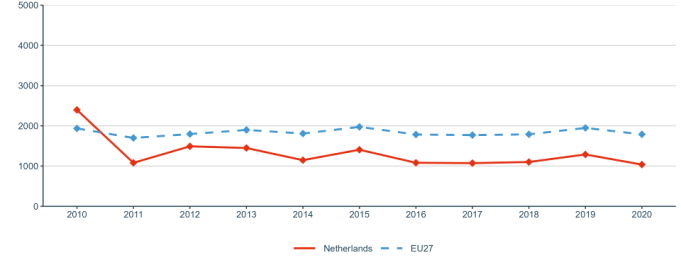
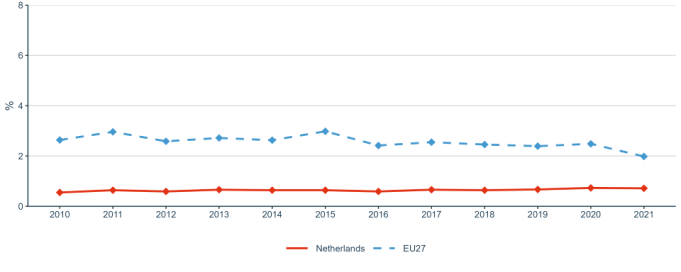
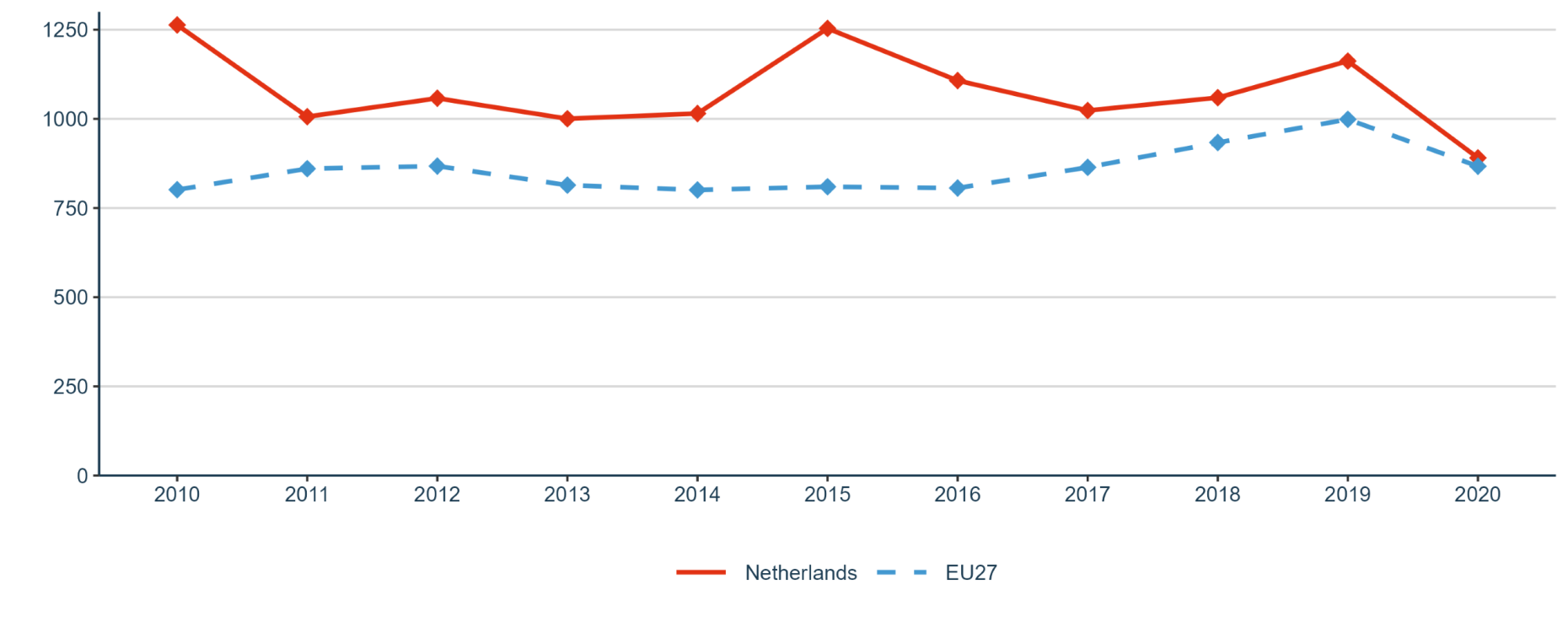

Sub-priority 2.2: Synergies with education and the European Skills Agenda
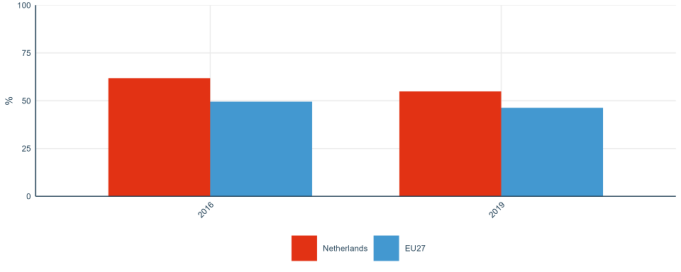
Sub-priority 2.3: Synergies with sectorial policies and industrial policy, in order to boost innovation ecosystems
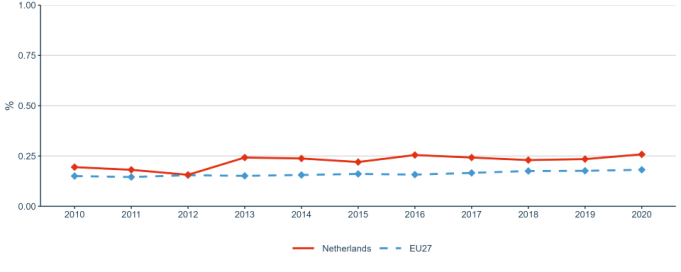
Sub-priority 2.4: An active citizen and societal engagement in R&I in all its dimensions
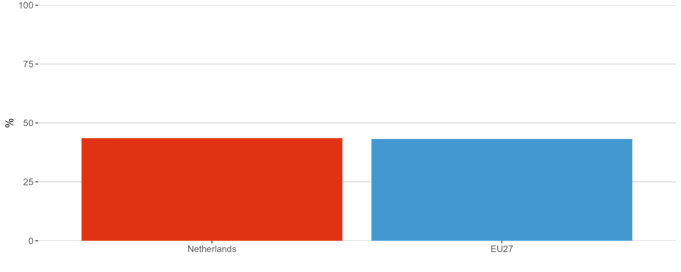
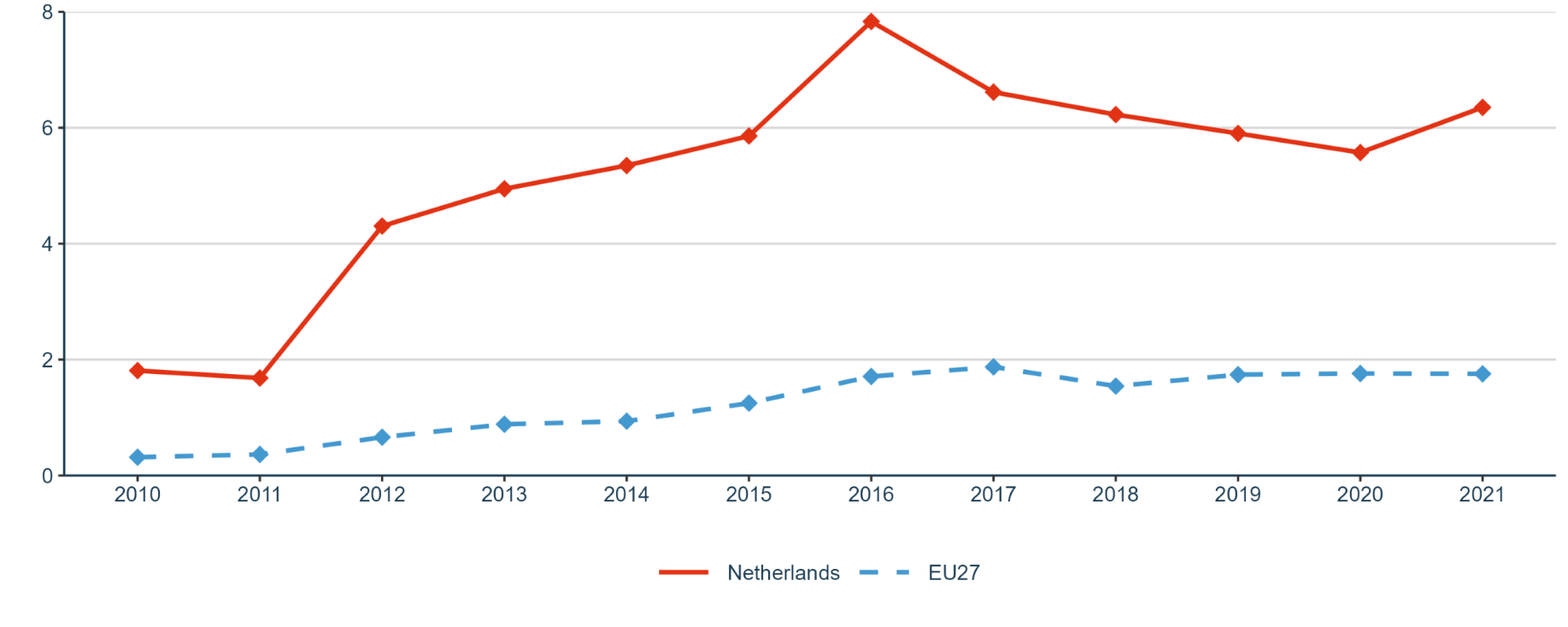
Priority 3: Amplifying access to research and innovation excellence across the Union
Sub-priority 3.1: More investments and reforms in countries and regions with lower R&I performance

Priority 4: Advancing concerted research and innovation investments and reforms
Sub-priority 4.1: Coordination of R&I investments
